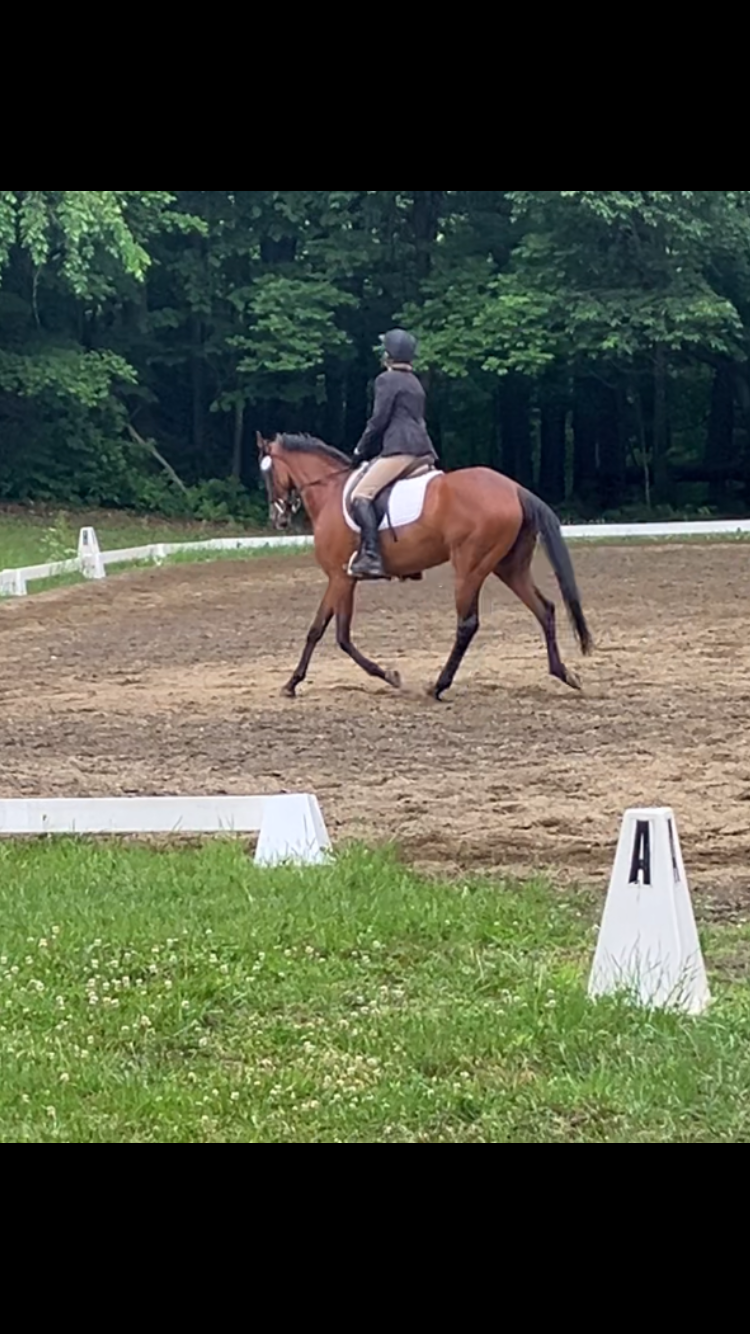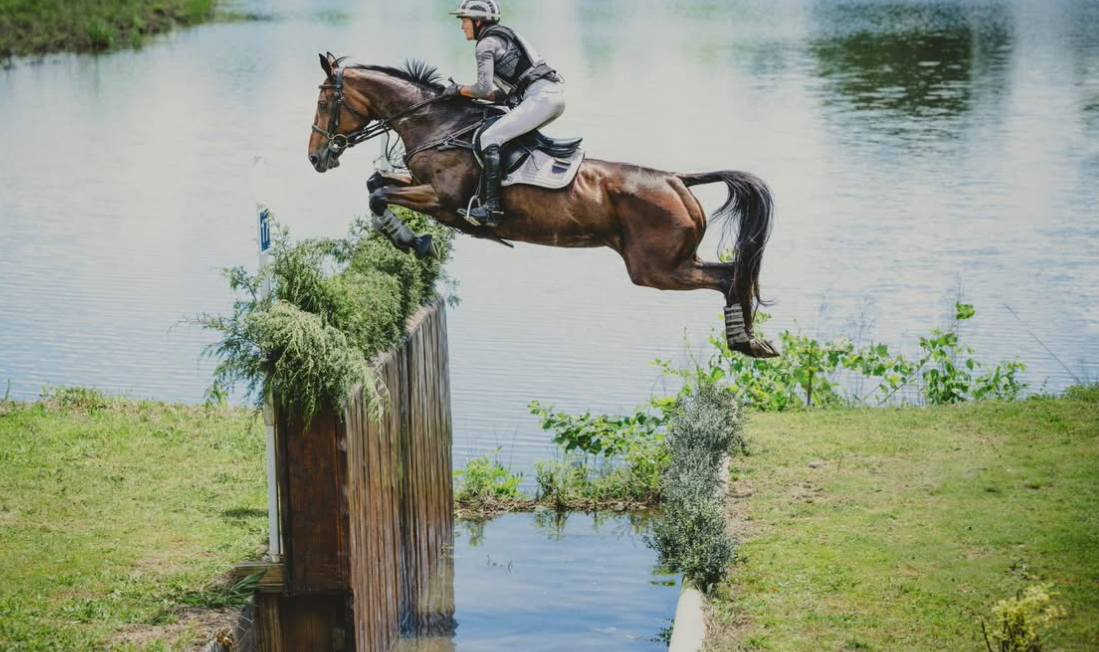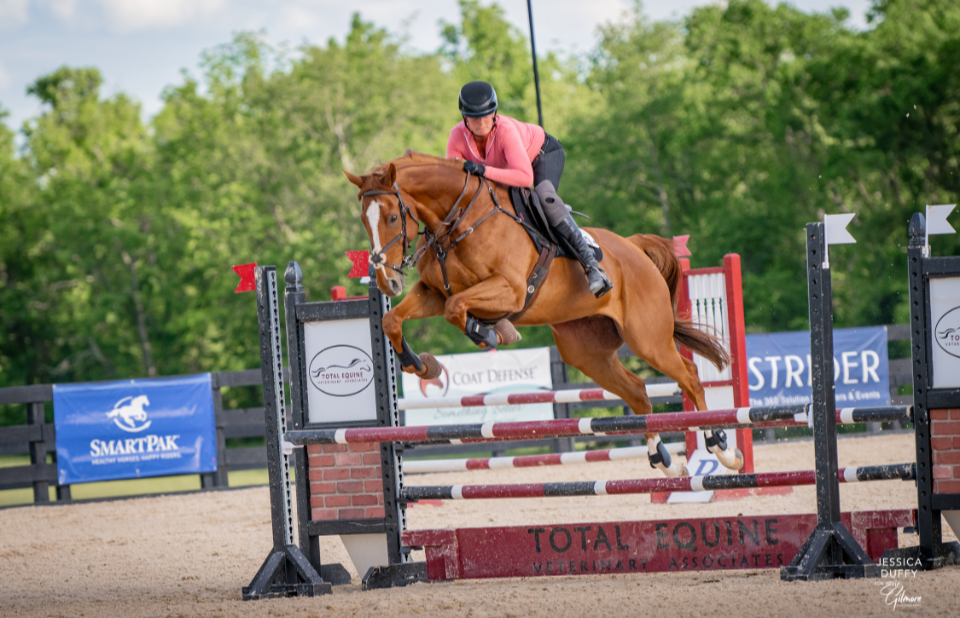
Photo via public domain.
“We are the beneficiaries of Col. Chamberlin’s genius, and horses around the world live far more comfortable and productive lives because of his work.” — Jim Wofford, who compares Chamberlin to Mozart
A graduate of the American, French, and Italian cavalry schools for advanced equitation, Chamberlin (1887-1944) rode in the Olympic Games of 1920, 1928, and 1932, as well as in countless national and international competitions, primarily as an eventer and show jumper. He also wrote two classic and still influential books: Riding and Schooling Horses (1934) and Training Hunters, Jumpers and Hacks (1937), the former a guide for developing “a good rider,” the latter for educating that rider in “breaking and training the horse.” It is not surprising that Wofford regards Chamberlin as “the leading light of the military horse world for three decades.
Life and Thought
The period between World Wars I and II—the “interwar” years of the 1920s and 1930s—witnessed two closely related developments in mounted warfare and in equestrian competition. First, horse cavalry, particularly in the United States, evolved into mechanized cavalry. Though cavalry officers continued in their principal role as trainers of military horsemen and horses, many also assumed an expected or assigned role as equestrian competitors. Second, elite international equestrian competition, suspended during World War I, exploded in the postwar years. Cavalry officers not only dominated competition, but, at the Olympic level, were the only riders allowed to compete. That context defined Harry Chamberlin, who became its epitome.
Chamberlin was born in 1887 to neither a military nor an equestrian family, as Warren C. Matha points out in his invaluable recent biography, General Chamberlin: America’s Equestrian Genius (a source for many of the facts below). Nonetheless, he entered West Point in 1906 and had a distinguished military career, rising through the ranks to become Colonel of Cavalry in 1939 and Brigadier General, commanding a special Task Force in the Pacific, in 1942. That post was cut short: Chamberlin returned to the United States in 1942 for treatment of cancer; though he remained on active duty, he died in 1944. Otherwise, his wartime service was limited to the Philippine Islands from 1911 to 1914 and the “Punitive Expedition” against Pancho Villa in 1916; he arrived in France in August 1918, three months before the armistice.
Chamberlin’s overall military service, however, comprises a series of important posts, all of them related to his equestrian expertise. Not long after learning to ride “the Army way” at West Point, Chamberlin graduated from the highly competitive Advanced Equitation Course in the U.S. Mounted Service School; he then joined its faculty. He also taught cavalry tactics at West Point and cavalry weapons and horsemanship at the Cavalry School (successor to the Mounted Service School). Following his transformative study in France and Italy in 1922-1924, Chamberlin taught at the Command and General Staff School at Fort Leavenworth; and, in 1941, he commanded the Cavalry Replacement Training Center at Fort Riley, created to provide recruits with basic training in military horsemanship.
Chamberlin’s career as a competitor easily rivals his career as an officer. He starred on the 7th Cavalry polo team in the Philippines, and then captained both the 8th Cavalry’s polo team and the newly established U.S. Army Horse Show Team in the mid-1920s. He rode in the Military Competition (Three-Day Event), Pairs Jumping Competition, and Individual Jumping Competition in the Inter-Allied Games of 1919 (a substitute for the cancelled 1916 Olympics); rode in the Military Competition, Dressage Competition, and Prix des Nations Jumping Competition in the 1920 Antwerp Olympics; and, following a long list of victories, he ended his competitive career with a Team Gold medal for the Military and an Individual Silver Medal for the Prix des Nations in the 1932 Los Angeles Olympics.
American military riding in the early twentieth century was based on French military equitation: the manual Notes on Equitation and Horse Training, for example, published by the U.S. War Department in 1910, was a translation of the drill regulations in use at the French cavalry school at Saumur. The French military style and seat had emerged from the precise haute école equitation developed by the mid-nineteenth-century master François Baucher and subsequently modified by James Fillis; the bold cross-country equitation developed by Baucher’s rival, Le
Comte d’Aure; and the integration of Baucherist and d’Aurist principles forged by General Alexis-François L’Hotte. The revolutionary theory of “forward riding” developed in the first decade of the twentieth century by the Italian cavalry officer Federico Caprilli, however, would change everything for U.S. riders.
Chamberlin was an agent of that change. Already a graduate of the U.S. Army’s Advanced Equitation Course, Chamberlin was admitted in 1922 to the French Cavalry’s school for advanced equitation, L’École d’Application de Cavalerie de Saumur, where he steeped himself in French theory and practice and graduated with distinction in 1923. He then was admitted in 1923 to the Italian Cavalry’s school at Pinerolo, and, having distinguished himself in it, gained entrance into the highly selective advanced school for equitation at Tor di Quinto, graduating in 1924. The Italian team had used the Caprilli forward seat to dominate jumping competition in the 1919 Inter-Allied Games, and Chamberlin mastered it at Tor di Quinto. He would combine the lessons learned at Saumur with those learned at Tor di Quinto to produce what the U.S. Army eventually would call “the Chamberlin military seat.”

Photo via public domain.
Published Work
Chamberlin’s legacy lies in his development of a new system of horsemanship based on French and Italian principles. He tested the particulars of this evolving system in articles originally published in military journals, and recently collected by Warren C. Matha in The Chamberlin Reader, a companion volume to Matha’s General Chamberlin. Chamberlin also gave the system full expression in two books concurrent with his articles: Riding and Schooling Horses and Training Hunters Jumpers and Hacks. Their influence endures. William Steinkraus has written, “So often, I think I have come up with an idea of my own, only to find it in one of Chamberlin’s books,” a sentiment shared by Jim Wofford: “I have been riding and teaching for half a century, and can safely say not a day goes by without my quoting from one of Chamberlin’s works, or applying his methods.”
Clearly impressed by the Italian equestrian team in 1919, Chamberlin published “Observations on Riding and Training Jumpers,” in the cavalry school annual, The Rasp, for 1922. In it, he advocated Caprilli’s fundamental principle that a horse (in Chamberlin’s words) “must be so
trained that he will approach and jump an obstacle as nearly as possible as he would do if running riderless and at liberty.” Chamberlin later concluded in “The Italian Cavalry School at Tor di Quinto,” published in The Cavalry Journal in 1924, that “the Italian system of equitation is not, in my opinion, suitable for our cavalry,” because it did not produce the “very ‘handy’ horse” that U.S. cavalry action required. He argued, though, for “an adaptation of our military seat along Italian lines” to improve cross country riding and jumping.
In subsequent articles in The Cavalry Journal, Chamberlin proposed balancing the French “classic seat” and the Italian forward seat primarily through modification of the latter (“The Modern Seat,” 1934); analyzed ideal conformation for event horses (“The Conformation of Three-Day Horses,” 1937); advanced L’Hotte’s precepts for combining manège and cross country training for cavalry horses (“High School for Horses,” 1937); explored effective training of cavalry officers and troopers (“Cavalry Training,” 1940); and prescribed training methods for water (“Crossing Rivers,” 1941). In a final short manual, Breaking, Training and Reclaiming Cavalry Horses (1941), Chamberlin detailed “four simple exercises . . . to break and train all colts and remounts [and to] render older horses obedient and supple for military and all other equestrian purposes.”
Chamberlin made his bones as a theorist, as it were, with Riding and Schooling Horses, a work that reflected yet another general development in military equitation in the interwar years. Since the eighteenth century, cavalry officers had written books almost exclusively for other cavalry officers as guides for training recruits; following World War I, however, cavalry officers—including such apostles of forward riding as Piero Santini, Vladimir Lattauer, Paul Rodzianko, and Chamberlin—began to write for an emerging civilian readership that included riders at widely varying levels of knowledge and skill. As Colonel Edwin M. Sumner noted, for example, Riding and Schooling Horses “was written primarily
for the novice,” but reading it definitely would benefit “the more experienced horseman.”
Setting out “to present clearly the fundamental principles of equitation and horse training,” Chamberlin first walks his reader through “Italian teachings” on the theory and practice of the forward seat—“a name erroneously applied in the United States to innumerable grotesque postures”—and maintaining it in motion, followed by chapters on equine psychology, the aids and proper use of the hands, and bits and bitting; he concludes with “the objectives and the sequence of training necessary to produce a well-mannered mount for any purpose” and with the essentials of proper jumping. His principles, he notes, are based on those taught at the “French Cavalry School at Saumur and American Cavalry School at Fort Riley, Kansas.”
One recurring motif stands out among the many principles advocated. “As in the case of so many other things,” Chamberlin writes, “the middle course . . . seems the safest, soundest, and surest.” In the case of riding and training, the middle course means combining Italian “principles regarding the seat” with French “principles of training and schooling the horse.” It also means, more broadly, that a horseman must learn to distinguish between fundamentals that never change—“The principles of the seat advanced herein remain the same for all types of riding.”—and particulars that always change: “While the principles governing the use of the aids are unchanging, the application of the aids in carrying out
these principles is rarely the same in any two particular instances.”
Learning that distinction is a prerequisite to developing “tact,” the quality essential for success in both riding and schooling. Chamberlin sometimes uses “tact” to refer to specific technical skills: the development of “educated hands,” for example, “the ability to fix the hand in the necessary place, with a resistance exactly equal to the horse’s resistance, and to yield the exact instant the horse yields.” He also uses it, though, to refer to the knowledge behind those skills—“the ability, first, to analyze each horse’s temperament, faults and defenses; second, to adopt suitable methods in training and riding in order gradually to dominate and control him”—and, equally important, to the judicious use of those methods, “knowing when to compromise, and when to fight it out . . . The moment the horse gives in, admitting defeat, the tactful horseman is prodigal of his rewards.”
Chamberlin refined and augmented those principles in his masterwork, Training Hunters, Jumpers and Hacks, published three years after Riding and Schooling Horses and judged by Vladimir Littauer, “in its field, the greatest book of the century, not only in the United States
but in the world.” As Chamberlin notes here, his earlier book “contained instructions and information necessary in the education of a good rider,” whereas “the prime objective of this work is to set forth for his use precise descriptions of normal methods for breaking and training the horse.” Like the earlier book, this work also spoke to two audiences: primarily, “the inexperienced amateur who desires to train his own horses,” and secondarily, “more experienced owners” who want to deepen their knowledge.
Based like its predecessor on principles developed at Saumur and adopted at Fort Riley, Training Hunters, Jumpers and Hacks opens with two chapters on conformation as the primary basis for selection of promising horses, followed by details on specific “beauties and defects of conformation.” Chapter III explores at length “the marks of an educated horse,” a matter “of tremendous importance as a theoretical basis for all equitation.” The remaining chapters treat the fundamentals for training horses for any discipline, but particularly for cross country riding and jumping: understanding equine psychology; demonstrating advanced riding technique; and possessing not only sound judgment, but
also the ability to instill it in the horse.
Training Hunters, Jumpers and Hacks carries forward some themes, and even specific language, from Riding and Schooling Horses. Though many equestrians, for example, “erroneously consider” suppling and relaxing exercises to be ends in themselves, they are, properly understood, means for “making the horse obedient and clever at his normal work.” The later book also introduces new themes. Since symmetry of form, or sound conformation, together with disposition, determines an equine’s potential ability, attending to “beauty” when selecting a horse is not frivolous. In Chamberlin’s aphorism: “From these facts an axiom is born: never buy a horse which offends the eye at first glance.”
The book’s central theme concerns calmness and boldness. A horse’s willingness to submit implies confidence in its rider, “confidence exhibited by calmness, boldness and relaxation”—the first among “the basic training objectives.” Boldness entails teaching the horse “willing, frank, forward movement,” and calmness entails riding and treating the horse with tact. The “foundation of boldness and calmness” supports the remainder of the training period, its ultimate objective being a horse who, “without having his calmness and boldness destroyed, [will be] completely subordinated to the aids.” When riding cross country and jumping, moreover, such a horse “will be exceedingly clever and brilliant because no excitement will interfere with his cool, experienced judgment.”
That central theme also aligns with the book’s central argument: effective training relies on “proper gymnastic exercises.” Since the head and neck are the horse’s “balancer and rudder,” Chamberlin argues, “the development of a natural, graceful head carriage is of paramount importance.” The extreme collection and flexion of haute école training cause the hunter or jumper to lose “all calmness and value,” so allowing the horse to relax by extending his head and neck is of “vital importance.” Effective training, then, includes advanced, though not haute école, schooling exercises, but it must rely fundamentally on gymnastics that improve “natural balance” if it is to produce horses fit for cross country work, horses who can “handle themselves cleverly when given their heads and left to their own devices.”
General L’Hotte’s genius lay in his combining Baucher’s manège system with d’Aure’s cross country system to produce an effective system for riding and training cavalry horses. Chamberlin’s genius lay in his combining L’Hotte’s French system with Caprilli’s “Italian system” to create the Chamberlin military seat and a distinctively “American” style of riding. Like his contemporary Étienne Beudant, moreover, Chamberlin had another kind of genius: the ability to explain a complex and subtle system in elegant, limpid prose, a testament, as Jim Wofford has put it, to “the power of the simple declarative sentence.” As accomplished a writer as he was a rider, Chamberlin left us two books not only dense with equestrian wisdom, but also pleasurable to read.

Photo via public domain.
A Note on Texts
In 2020, the equestrian publisher Xenophon Press issued four uniformly bound volumes related to Chamberlin: the biography, General Chamberlin, written by Matha; the compilation of primary documents, The Chamberlin Reader, edited and with commentary by Matha; and reprints of Chamberlin’s Riding and Schooling Horses and Training Hunters, Jumpers and Hacks, each introduced by Matha. Though variable in kind and quality, they collectively represent an important addition to the shelf of modern equestrian literature.
A knowledgeable horseman, Matha is not a professional biographer or editor, so these works have limitations in writing and editing. Constant use of historical present tense, for example, flattens prose and collapses chronology; conflicting principles for selection of material result in idiosyncratic choices; and indiscriminate detailing produces minutiae and redundancy. Matha, however, is a devoted and enthusiastic amateur in the best sense of the word. He knows and loves his subject, Chamberlin’s life in its interwar cavalry and equestrian contexts; he has researched that subject exhaustively; and he has made primary texts (and 150 photographs), otherwise very rare, readily available. In short, Matha has done both Chamberlin and the equestrian community a great service.
So has Xenophon Press. Chamberlin’s Riding and Schooling Horses and Training Hunters, Jumpers and Hacks, first published in limited editions in the 1930s by Derrydale Press, the storied specialty sporting house, were reprinted in larger editions of cheaply made books in the 1940s and 1950s. Derrydale copies are hard to find and, in good condition, costly; reprinted copies are easier to find and inexpensive, but they are rarely in good condition. The sturdy and affordable Xenophon Press reissues, essentially facsimile editions with text, photographs, and drawings intact, reclaim two of the most influential works of early twentieth-century horsemanship, works that belong in every equestrian’s library.
Charles Caramello is John H. Daniels Fellow at the National Sporting Library and Museum in Middleburg, Virginia, and the author of Riding to Arms: A History of Horsemanship and Mounted Warfare, published in January 2022 by University Press of Kentucky.











































